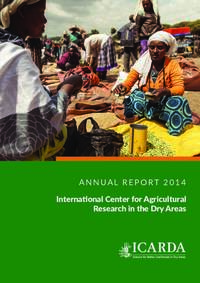2014 went on record as the hottest year ever measured, a telling sign that climate change is already here. The agriculture sector is predicted to take the heaviest toll, with the hardest hit being smallholder farmers in developing countries, particularly in dry areas. With rising temperatures and greater stress on water resources, agricultural productivity is set to experience a substantial decline. Yet against these odds, we need to produce progressively more to feed a rapidly growing world population.
The good news is that science and technology are increasingly and unambiguously showing us ways to overcome these hurdles, through cutting-edge approaches like genomics, biotechnology, geo-informatics, climate-smart agriculture and systems modeling tools.
We are pleased to share these select scientific innovations and impacts of our agricultural research on drylands in 2014, where the challenges with scarce natural resources are even starker. Implemented on the ground with national partners, many of these 2014 activities and their outcomes directly bolstered the systems research of Dryland Systems, the global research program of CGIAR that ICARDA is leading.
Keywords:
water& land productivity
livestock productivity & rangeland management
conservation of agricultural biodiversity
land races
nutritive quality
sunn pest
west asia
central asia and the caucasus
south asia and china
arabian peninsula
agriculture
biodiversity
crop production
development
disease control
farming systems
genetic resources
germplasm conservation
harvesting
irrigation
land use
livestock
poverty
rangelands
research
ruminants
rural communities
sustainability
vegetation
water harvesting
water management
remote sensing
sheep
seed production
goats
agronomic characters
animal production
malnutrition
genetic variation
dryland farming
cicer arietinum
biological control
hordeum vulgare
genetic markers
grassland management
microsatellites
medicago sativa
pest control
genetic maps
reclamation
human resources
international cooperation
resource management
genetic resistance
rural development
training
cold
arid zones
north africa
pest resistance
drought resistance
semiarid zones
geographical information systems
lens culinaris
triticum aestivum
triticum durum
lathyrus sativus
aegilops
pisum sativum
trifolium
trigonella
vicia narbonensis
feed legumes
shrubs
agricultural development
plant collections
pastures
steppes
environmental degradation
mechanical methods
research networks
stubble cleaning
temperature resistance
diffusion of information
agroclimatic zones
middle east
fruit trees
resource conservation
vicia faba

